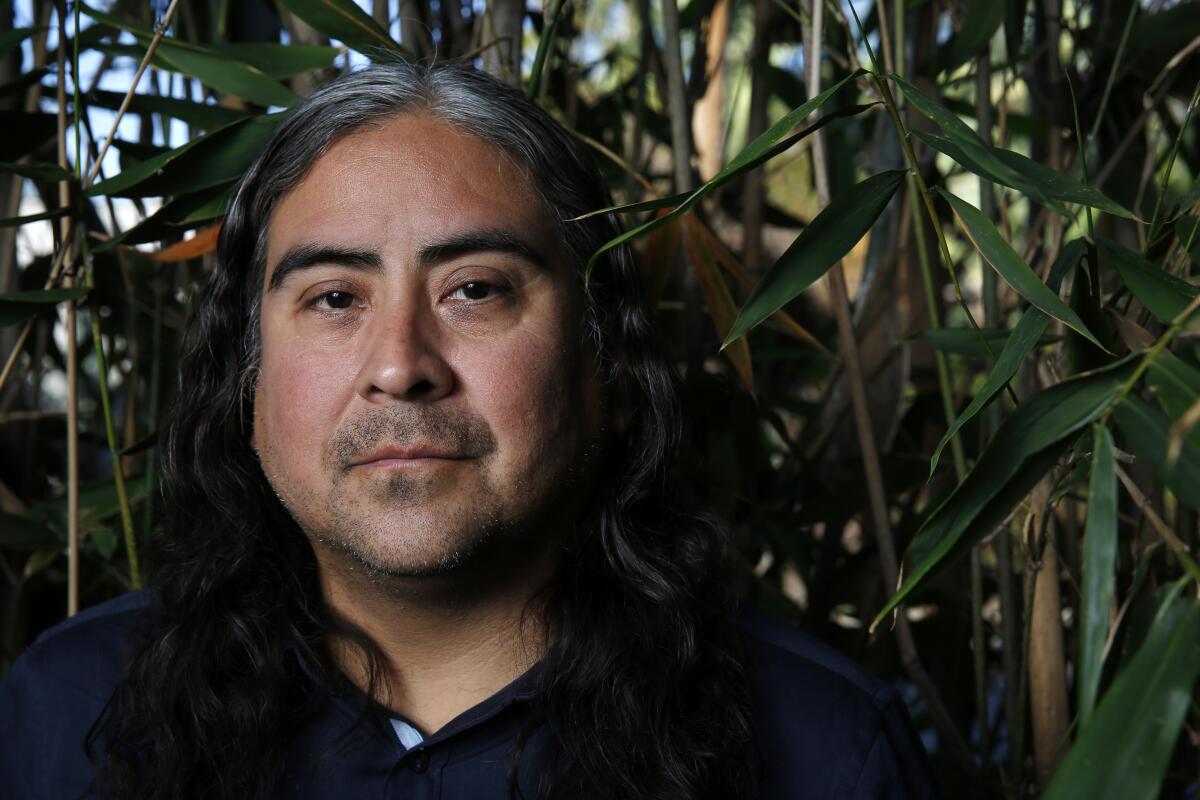Raven Chacon’s ‘Voiceless Mass’ magnifies unsung voices into the realm of the sacred

- Share via
Raven Chacon’s 2022 Pulitzer Prize-winning “Voiceless Mass” is a mass without sung voices in the guise of an organ concerto. Written for the large organ in Milwaukee’s Cathedral of St. John the Evangelist, where the instrumental ensemble can be spread over a grand space, the concerto gives individuality to instrumental voices surrounding the audience while in dialogue with the resonant, spiritually uplifting organ.
The effect, as Chacon has described it, is meant to give voice to the voiceless. Not only was this a commission specifically from a Native American composer for the annual Thanksgiving concert by Milwaukee’s Present Music, but the performance also happened in the midst of racial justice demonstrations. Two days before the premiere of “Voiceless Mass” last year, Kyle Rittenhouse had been controversially acquitted of all charges in the fatal shooting of two men and the wounding of a third during a protest in nearby Kenosha, Wis. Yet a livestream of that performance revealed an almost miraculous atmosphere in the cathedral, in which “Voiceless Mass” released tension by magnifying unsung voices into the realm of the sacred.
For the record:
2:50 p.m. May 10, 2022This story previously said the Cathedral of St. John the Evangelist is in Minneapolis. It’s in Milwaukee. It also said Present Music is in Minneapolis. It too is in Milwaukee.
The first Native American to win the Pulitzer music prize, the 44-year-old Chacon is a composer, performer and multimedia installation artist from Fort Defiance in the Navajo Nation in Arizona. He is best known in Los Angeles for his revelatory contribution to the celebrated 2020 opera “Sweet Land.” Created by The Industry, it too served as a radical rethinking of Thanksgiving. Chacon, moreover, graduated from CalArts, where he studied four of the more progressive and provocative composers of our day — Morton Subotnick, James Tenney, Michael Pisaro and Wadada Leo Smith — each one of them representing a different avant-garde tradition.
Chacon‘s largest presence is in the Southwest, where he lives in Albuquerque and works as both an artist and educator. He is the composer-in-residence for the Native American Composer Apprentice Project, where he teaches young Native Americans to write string quartets. He has also written a haunting teaching quartet, “The Journey of the Horizontal People,” for the Kronos Quartet’s “50 for the Future” project.
Among Chacon’s large number of chamber pieces, several are an intriguingly diverse group of instruments — be it “Report” for firearm ensemble, “Whistle Quartet” for dog whistles, “Taa’go Deza” for singing cellist, “Scream Out of Each Window” for a family to perform, “Chorale” for 4 – 8 docked ships with fog horns — as well as many more for traditional ensembles and soloists. But for the most part, he has remained on the fringes of the new music scene in the U.S. Europe, on the other hand, has taken notice: Probably the most reliable place to catch a Chacon performance is on one of the new music programs broadcast by the BBC on its Radio 3 classical channel.
The other place where you are likely to encounter Chacon is in a gallery or museum or at a national monument. He has brought deep listening to documenta in Kassel, Germany, and a rare spirituality to the Whitney Biennial. For the Canyon de Chelly National Monument in Chinle, Ariz., his 2012 sound installation that used stainless steel sculptures, piano wire, solar panels and amplifiers redefined what an electric tower could sound like.
While “Voiceless Mass,” like much of Chacon’s work, is a piece d’occasion, the composer has expressed interest in finding other apt large sacred spaces with large pipe organs. Southern California just happens to have two of those, each boasting one of the world’s largest church organs: First Congregational Church of Los Angeles and Christ Cathedral (formerly Crystal Cathedral) in Garden Grove, where its humongous Hazel Wright Organ has just been restored. The second performance of a new Pulitzer Prize piece could — hint, hint — be just the thing for its dedication, which just so happens to be slated to happen around Thanksgiving.
More to Read
The biggest entertainment stories
Get our big stories about Hollywood, film, television, music, arts, culture and more right in your inbox as soon as they publish.
You may occasionally receive promotional content from the Los Angeles Times.











